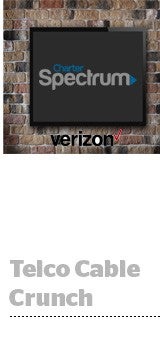 More telecom-media merger mania!
More telecom-media merger mania!
Verizon is considering a merger with cable company Charter Communications, according to The Wall Street Journal, just months after AT&T revealed its intent to acquire Time Warner for $85.4 billion.
If Verizon and Charter combine, the magnitude would be massive in terms of infrastructure and audience scale, as well as in the delivery of addressable services.
If a deal were to materialize, Jim Nail, principal analyst at Forrester, predicted it would be more similar to Comcast going after Time Warner than AT&T merging with DirecTV.
“It seems to me more like an expansion of footprint than updating the technology base,” he said. “So more about bandwidth than an infrastructure play.”
Although many experts believe the potential deal is more about network and bandwidth strength, there are TV implications as well.
Charter is now the second largest cable provider in the US after Comcast (in subscribers) and serves about 25 million business and residential customers in 41 states. Its merger with Time Warner Cable last year added about 11 million new cable households, bringing its total video subscribership close to 17 million.
“[A merger] would open the doors for Charter to better compete for video subscribers on a national scale,” said Randy Cooke, VP of programmatic TV for SpotX. “The proliferation of internet-based programming distribution is challenging for incumbent MSOs whose business models are predicated on servicing regional customers through the physical cable plant.”
Assuming the deal actually completes, Verizon could be in a position to unite viewers who watch video across multiple screens and platforms.
“A Verizon-Charter combo would yield a powerful footprint and a diversified content, advertising, mobile and MVPD platform to create new (ad-supported) offers viewers and subscribers,” said Rick Ducey, managing director of BIA/Kelsey’s consulting practice.
“That kind of cross-platform scale with lots of customer data opens up some very interesting scenarios.”
A merger could also spark new revenue opportunities for Verizon as the market for wireless services peaks, Ducey predicted. That strategy would be in line with why Verizon acquired AOL and is looking to acquire Yahoo.
“Ad tech and content are avenues where they can continue to build audiences and get to more scale in impressions to monetize,” Ducey said.
And speaking of ad tech, Verizon foreseeably would gain access to Charter’s addressable TV ad division, Spectrum Reach, which houses the former Time Warner Cable Media business and its creative TV agency, Kernel.
But addressability notwithstanding, Verizon’s flirtation with Charter shows that when it comes to content delivery and telco services, “scale still wins,” said Dave Morgan, CEO of Simulmedia.
“If the hope is to compete with AT&T as well as Google and Facebook in the ad business, buying Charter is table stakes for the scale to play at that table,” Morgan noted.












